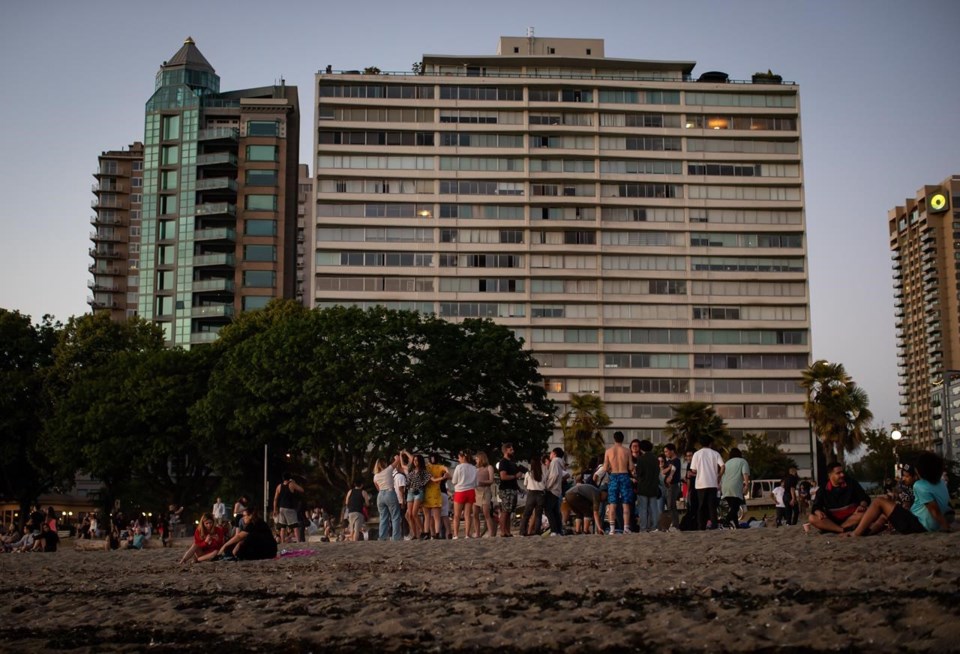VANCOUVER — Advocates for renters in British Columbia say it's time to consider setting a maximum temperature for rental housing to protect vulnerable tenants from dangerous heat.
The call comes as a heat wave blankets much of the province, raising memories of the deadly 2021 heat dome event. It isn't expected to get as hot this week, but the advocates say municipalities need to ensure that tenants don't face deadly risks of overheating in their homes.
Vancouver Mayor Ken Sim says the city has nearly finished a study on indoor heat that could lead to changes to the city’s building code or bylaws.
While B.C. municipalities set bylaws mandating the minimum temperatures rental units must be able to maintain, there are no similar rules for how hot a home is allowed to get.
Emily Rogers, director of operations for Victoria's Together Against Poverty Society, says amending property bylaws to include a maximum temperature "seems like a very reasonable step."
"I think in a time of climate crisis, and increasing extreme heat, it's very reasonable to be thinking about maximum temperatures and ensuring that tenants aren't susceptible to heat-related injury and potentially death," she said.
During the summer 2021 heat dome, more than 600 people died as result of extreme temperatures that surpassed 40 C in parts of the province. A review by the BC Coroners Service found most were elderly and vulnerable people in buildings without air conditioning.
Temperatures in the mid-to-high 30s are expected for most of the coming week, leading provincial officials to warn again about the dangers of soaring temperatures.
The province has said a repeat of the heat dome is not in the forecast but has warned people to take precautions to stay out of the heat, drink water and limit activity.
Lasse Hvitved, a legal advocate with the Tenant Resource and Advocacy Centre, said under the province's Residential Tenancy Act it's the landlord's responsibility to provide adequate heating and it's up to municipalities to define what those requirements are.
In Vancouver, Richmond and Surrey, bylaws say heating systems need to be capable of maintaining every room at a temperature of 22 C, while in Victoria, the minimum is 21 C.
Hvitved believes if the act were written today, similar rules around maximum temperatures would have been included.
"The only reason it's not included is because at the time when it was last rewritten, this sort of heat dome and heat waves weren't at the forefront of our minds," he said.
"It's the landlord's responsibility for heating. It's the landlord's responsibility for mould. It's the landlord responsibility that you have water. It's the landlord's responsibility that the place lives up to health and safety standards.
"So it sort of seems like an abnormality that for some reason tenants are responsible for providing their own cooling."
Vancouver Mayor Sim said in a statement that the city has been conducting "a multi-year indoor heat temperature survey" set to wrap up at the end of the summer.
"The data collected will be used to explore ways to achieve cooler indoor temperatures and prevent heat-related illness or death," Sim said.
"This could include a variety of measures, such as potential changes to the city’s building code or bylaws among others."
Hvitved said some flexibility for landlords could be considered, with different rules for buildings with seniors or other vulnerable populations. He added that if cooling became a landlord's responsibility, more efficient systems could be set up.
He said he's heard from renters whose homes have reached as high as 36 degrees inside and who face barriers in getting air conditioning because of their landlords.
Last week, Emergency Management Minister Bowinn Ma recommended that people consider keeping a digital thermometer to measure indoor temperatures, noting that indoor temperatures of 31 degrees or higher can be dangerous, especially for people who are more vulnerable to heat.
The province announced in June that it was launching a $10-million fund to purchase and install up to 8,000 air conditioners for low-income and vulnerable people. But advocates have expressed worry that requiring a landlord's consent to obtain the free air conditioners is putting up an unnecessary barrier for tenants.
Rogers said it would be helpful if the provincial residential tenancy branch convened experts to provide tenants and landlords with guidance on what's reasonable.
"Bottom line, tenants need to have a safe place to live and being protected from extreme heat is part of that. We know that renters are more likely to be people with disabilities. We know renters are more likely to be seniors on fixed income. We know that renters are more likely to not have access to outdoor spaces or sometimes not even have balconies," she said.
"So for all of these folks, the more medically vulnerable you are, the more susceptible you are to extreme heat, and it's incredibly important that people have access to a safe place to be during times of emergencies."
This report by The Canadian Press was first published Aug. 14, 2023.
Ashley Joannou, The Canadian Press

